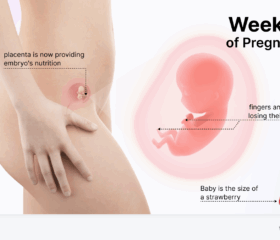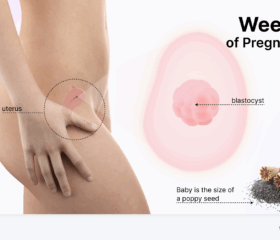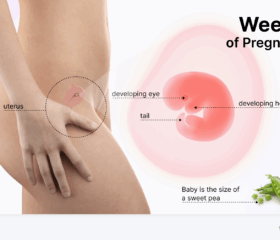Pregnancy Week by Week
23 Weeks Pregnant
Your baby is as big as a large pomegranate.
11.3
inches
1.10
pounds
23 Weeks Pregnant: Symptoms, Your Baby’s Growth, & Tips
This week, your baby will start a big growth spurt—he’ll double in size over the next month. Your own body is also changing more and more each day, with some noticeable physical developments and possibly new pregnancy symptoms appearing.
Read on to learn what you can expect at 23 weeks.
Your baby at 23 weeks
Your baby is about the size of a large pomegranate, measuring around 11.3 inches and weighing just over a pound. 12 Over the next four weeks, he should get twice as big.
Here’s what else is happening this week:
- Skin: Your baby’s skin is still a bit saggy because it’s growing faster than his fat is being deposited. Don’t worry, though; your little one’s fat deposits will soon fill things out. By the time he’s born, he’ll look a lot plumper. 3 At this stage, your baby’s organs and bones are still visible through his skin. 4
- Developing senses: Your voice is still his favorite, with research suggesting that babies in utero prefer their mother’s voice over all others. 5
- Digestive practice: Your baby’s digestive system is also getting ready for life outside the womb. The wave-like movements that propel food along his digestive tract should have already started by 23 weeks. While there’s no actual food to digest yet, it’s important practice for when he’s born. 6
- Fingerprints and footprints: He’s already developing his unique features. Little ridges are forming on your baby’s palms and the soles of his feet, which will eventually become his fingerprints and footprints. 7
- Movement: You’ve got quite the athlete in there. By this point, he’s getting more and more active, and you’re likely feeling your baby kicking and moving fairly often now. Enjoy these lighter kicks, as they’ll soon get stronger and may even be a little painful.
While your baby’s developing, you should also take a proactive approach to protecting his overall and long-term health, which you can do by first protecting yours. Ask your doctor about any vaccines you need to get at this stage (note that you can get the flu shot while pregnant, regardless of what trimester you’re in).

Your body at 23 weeks
As your baby continues to grow, your body is changing, too. This week, you may notice changes such as:
- Linea nigra: You may see a dark vertical line running down the center of your belly, called the linea nigra. This is a common pregnancy emblem that comes about as a result of your changing hormones. 8 Don’t worry. It will fade after you deliver.
- Melasma: Some women, especially those with darker skin, may get melasma, commonly known as the mask of pregnancy. You might see discoloration on your face, particularly around the nose, forehead, cheeks, and eyes. 9
- Other discoloration: Your areolas may appear darker, and you might notice a deeper tone in your freckles. Note that most skin changes during pregnancy are temporary and should fade after delivery. 10
- Swollen ankles and feet: Many women experience swollen feet during pregnancy, so don’t be surprised if your feet (and ankles) look at little puffy at 23 weeks. 11
Your symptoms at 23 weeks
At 23 weeks pregnant, you may be experiencing new symptoms as your body adjusts to the demands of pregnancy, as well as a few old friends. Your pregnancy symptoms may include:
- Lower back pain: Who knew carrying a tiny human 24/7 would be such a strain on the back? You may find your aches are more pronounced now, as your growing baby is putting pressure on your spine. 12
- Increased appetite: Carrying a baby is hungry work, and you might find yourself stepping up your daily calorie consumption.
- Bloating: Your body is producing the hormone progesterone, which slows down digestion. This means you might often deal with bloating during your pregnancy. 13
- Bleeding gums: Those changing hormones may also make your gums more sensitive, leading to swelling and bleeding. 14
- Snoring: Nasal congestion caused by your extra weight and swollen mucous membranes could cause you to snore. 15
- Pregnancy brain: Many women experience pregnancy brain, which can leave you feeling foggy and forgetful.
- Leaky breasts: By 23 weeks, your breasts may have already started leaking colostrum, the pre-milk that will be your baby’s first food. 16
- Tingling hands: The swelling in your body may put pressure on the nerves in your wrists and cause the same kind of tingling that’s associated with carpal tunnel syndrome. 17
What are Braxton Hicks contractions?
Braxton Hicks contractions are another infamous symptom of later pregnancy. They usually feel like a tightening in your belly, but they aren’t painful.
Many women mistake Braxton Hicks contractions for a sign they’re going into labor early. However, these mild and temporary contractions are more like a practice run for the real deal—they don’t indicate labor. 18
You can time your contractions by using a pregnancy tracker app (the best pregnancy trackers also include educational content on distinguishing these contractions from true labor). Braxton Hicks contractions tend to be shorter than those caused by labor.
Watch out for preeclampsia symptoms
Be aware of the symptoms of preeclampsia, a serious pregnancy complication characterized by:
- High blood pressure
- Sudden or severe swelling on your face, hands, or feet
- Headaches
- Blurry vision (or other big changes to your vision)
If you have any of these symptoms, try not to panic. They can also be caused by much milder conditions. Still, the best thing to do is contact your doctor immediately.
How to stay healthy and manage your symptoms at 23 weeks
This week, focus on self-care and preparing for the remainder of your pregnancy. Here are some tips to help:
Prioritize sleep
Getting a good night’s sleep can be challenging during pregnancy, with some studies suggesting that up to 76% of pregnant women experience sleep problems. 19 If you’re dealing with pregnancy insomnia, here are ways you can improve your sleep:
- Avoid the wrong sleeping positions for pregnancy (i.e., flat on your back) and sleep on your side, which improves blood flow to both you and your baby
- Try to maintain a regular sleep schedule
- Make sure to keep your room cool, dark, and quiet
Invest in a pregnancy pillow
If you’re struggling to get comfortable at night, consider getting a pregnancy pillow. Many women find putting one between their legs when going to sleep helps them get shut-eye more easily.
Make time to relax
As exciting as pregnancy is, you don’t need to be told that it can also be stressful. Take time to relax and try out activities like yoga, meditation, or pilates (although if you do, make sure to use an instructor trained in prenatal exercise).
If you need a break from everything, why not plan a babymoon with your partner? Now’s a great time for that—before you get into the third trimester and even moving becomes a challenge.
Stay hydrated
You need to drink plenty of water. Not only does this keep your baby healthy, it can help prevent UTIs, constipation, and overheating, as well as alleviate swelling. You should drink at least 8–12 cups per day throughout your pregnancy. 20
Monitor your baby’s movements
You should get in the habit of monitoring how much your baby is moving. If you notice he’s less active than usual, speak with your doctor straight away, as this could indicate a problem.
Eat well
If you’re feeling hungrier than before, embrace it! You need extra nutrition to support your growing baby.
However, that doesn’t give you free rein to gorge on cookies and candy bars. Make sure you incorporate plenty of nutritious food into your pregnancy diet, like fresh fruits and vegetables. If you find yourself craving junk food, try to find alternatives and keep healthy pregnancy snacks on hand.
Choose organic options if you can to reduce your exposure to harmful pesticides. Either way, what’s most important is that you thoroughly wash all your produce first.
Contact your doctor if you’re craving non-food items
If you’re craving non-food items, like dirt or paper, it’s a sign that you have pregnancy-related pica. This is a condition that’s caused by a lack of nutrients, such as iron or zinc.
Choose pregnancy-safe hair care options
If you love styling your hair, be cautious, especially when considering chemical hair treatments. Your changing hormones can make your hair react differently to the chemicals. It’s best to opt for safer treatments like highlights, all-vegetable dyes, or ammonia-free blends. If you’re unsure what to pick, talk to your stylist—and your doctor.
How to plan and prepare at 23 weeks
Now that you’re at a stabler and less draining point in your pregnancy, start planning for the arrival of your little one.
Consider maternity leave
Start planning your maternity leave with your employer and HR department. Make sure you understand your company’s policies. If you have a partner or co-parent, determine whether they can take leave as well.
Look into childcare
If you’ll need childcare after the baby arrives, start looking into options now. Research childcare centers or nannies and consider the costs and what works best for your family.
Prepare your finances
While your baby will bring you plenty of joy, he’ll also drain your bank account. Review your health insurance coverage, consider writing or updating your will, and start a savings account for your baby if you haven’t already.
Get ready for breastfeeding
While it might seem early, you can start preparing for breastfeeding your little one (especially as many women start leaking colostrum as early as 16 weeks). 16 Even if you haven’t started leaking yet, it’s a good idea to stock up on nursing pads.
Consider hiring a doula
Many women choose to hire a doula, a trained labor coach who offers support during labor and delivery. If you’re interested, now’s a good time to start looking. You can speak with your doctor or birth class instructor or even ask your family or friends for recommendations. You can also check out the DONA International website to find a doula.
Since they’ll be with you during one of the most pivotal moments of your life, it’s important to put a lot of thought into this decision and choose the doula that’s right for you.
Final thoughts
As your second trimester rolls on, remember to look after yourself and get that all-important rest your body needs.
Again, if you haven’t already, now’s the perfect time to plan a babymoon. Whether you want to finally tick off a bucket list destination or just book a cozy hotel closer to home, do something to enjoy your last baby-free moments before you’re up to your knees in diapers!
Article Sources
- National Health Service. "Week 23" Retrieved June 24, 2025.
- Baby Your Baby. "Fetal Growth Chart" Retrieved June 24, 2025.
- Nemours KidsHealth. "Pregnancy Calendar: Week 23" Retrieved June 24, 2025.
- The Birth Company. "Week 23 of pregnancy (Days 161-167)" Retrieved June 24, 2025.
- Proceedings of the National Academy of Sciences. "Mother’s voice and heartbeat sounds elicit auditory plasticity in the human brain before full gestation" Retrieved June 24, 2025.
- StatPearls. "Physiology, Peristalsis" Retrieved June 24, 2025.
- Humanitas Research Hospital. "Fetal development: The 2nd trimester" Retrieved June 24, 2025.
- Birth and Baby. "Linea nigra, Pregnancy" Retrieved June 24, 2025.
- MedlinePlus. "Melasma" Retrieved June 24, 2025.
- PeaceHealth. "Breast Changes During Pregnancy" Retrieved June 24, 2025.
- Nemours KidsHealth. "Dealing With Swollen Ankles During Pregnancy" Retrieved June 24, 2025.
- Johns Hopkins Medicine. "Back Pain in Pregnancy" Retrieved June 24, 2025.
- University of Rochester Medical Center. "Pregnancy: How Your Digestion Changes" Retrieved June 24, 2025.
- Penn Dental Medicine. "How To Treat Your Bleeding Gums in Pregnancy" Retrieved June 24, 2025.
- Sleep Foundation. "What Causes Snoring in Pregnancy?" Retrieved June 24, 2025.
- Pregnancy, Birth and Baby. "Antenatal expression of colostrum" Retrieved June 24, 2025.
- University Hospitals. "Tingling, Aching Hands in Pregnancy? It Could Be Carpal Tunnel Syndrome" Retrieved June 24, 2025.
- Tommy’s. "Braxton Hicks" Retrieved June 24, 2025.
- Breathe 2022. "Sleep disorders in pregnancy" Retrieved June 24, 2025.
- American College of Obstetricians and Gynecologists. "How much water should I drink during pregnancy?" Retrieved June 24, 2025.







